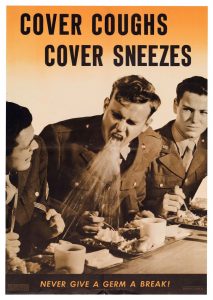Five ways to reduce your risk of catching the flu
With a huge spike in the number of cases of influenza recently reported in the southern hemisphere, it’s worth taking extra care of your health at the moment. According to Flutracker the virus is spreading around the country, with a sharp increase in reports of the virus in Australian and New Zealand.
As influenza is a debilitating and potentially deadly condition that’s guaranteed to make you feel miserable for at least a week or two, prevention is always better than cure.
Five ways to reduce your risk of catching the flu
1. If in doubt stay at home
If you feel unwell, isolate yourself as much as possible. That means not soldiering on and going to work or school and sharing the virus with your colleagues, let alone everyone on the bus and your favourite barista. If you have to mix with people, wear a mask (no matter how socially awkward it makes you feel) and always cough into your elbow (not your hands, which spread the virus to the next surface you touch).
Because some infected people insist on going out, it puts everyone all at risk. Even if you’re well it might be worth masking up on public transport and other crowded places. Masks have been proven to reduce the risk of getting infected, if worn correctly.
2. Wash your hands
Influenza is usually passed on by droplets spread by someone coughing, sneezing, blowing their nose or vomiting. If the droplets don’t land on you directly, they can still be transferred from things you touch, such as door knobs or handrails. We unconsciously touch our mouth, nose and eyes many times a day, transferring the virus directly into our body.
Regular hand washing is a good habit to get into, especially during flu season. It’s important to do it frequently, especially after being on public transport or when you’re around unwell people. Old fashioned soap and hot water is all you need, lather up and rub them for at least 30 seconds, making sure you get to all parts of your hands and fingers and then dry them well. I’m not a fan of hand sanitiser and antibacterial soaps. Even the US Food and Drug Administration now cautions against them. Regular hand wipes (without triclosan) could be an option for those who can’t easily access soap and water.
3. Boost your vitamins
Vitamins A, C and D are vital for a health immune system. Vitamins A and C also play a role in keeping that first point of contact with a virus (such as our mucus membranes in the nose, eyes and mouth) resilient against infection. Adding Vitamin E to the mix can also be useful (such as in “A, C, E” based supplements).
4. Get more rest
Our immune system loves it when we sleep well and get at least seven hours sleep each night. Being tired and rundown can severely impact different aspects of our immune system, including our ability to quell an infection.
Isn’t it better to voluntarily invest more time in sleep, than being laid out for days with flu?
5. Chill out
It’s not just physical stresses like under sleeping that impact the body’s ability to fight off an infection. Psychological stress can also impair our immune system. Meditation, appropriate exercise, laughter and lightening your load are more important than ever during the flu season.
Should you get the flu vaccination?
Getting any vaccine is a personal decision. Looking at the evidence, The Cochrane Collaboration (considered to be the gold standard of evidence-based medicine) has carried out a number of reviews regarding the effectiveness of the influenza vaccine.
Cochrane concluded the evidence around the vaccine’s safety and effectiveness in the vulnerable, elderly population was of such poor quality that they couldn’t draw a conclusion. However, vaccine use in healthy adults had a “very modest effect” on symptoms and work days lost.
Closer to home, the most recent Flutracker update (week ending 30 July 2017) reported “Across Australia, fever and cough was reported by 2.3% of vaccinated participants and 2.9% of unvaccinated participants. Fever, cough and absence from normal duties was reported by 1.8% of vaccinated participants and 2.0% of unvaccinated participants.”
These statistics suggest a very small advantage in being vaccinated. But this is not failsafe.
For those who choose the jab, studies show that stress can impede your immune response to the vaccine, so self-care is still an important strategy to help your body resist the virus.
Are there any guaranteed ways to avoid catching the flu?
Other than living in a bubble, nothing is foolproof.
Although some people swear by echinacea, elderberries and olive leaf extract, like the flu vaccine, there’s not enough evidence to predict if it will work for you. But choosing a course of action whether it is natural or conventional, should increase your chances of warding off this debilitating virus.
Regardless of what you take, over the next couple of months there are two proven strategies to minimise your chance to get the flu – reducing stress and washing your hands more often.
Do you live in Sydney? Don’t miss the August flu prevention and recovery special.
Similar Posts:
Social Share
2 Comments
Leave a Reply
You must be logged in to post a comment.








Pingback: Gill Stannard August update - Gill Stannard
Pingback: Gill Stannard Should you be worried about coronavirus? - Gill Stannard